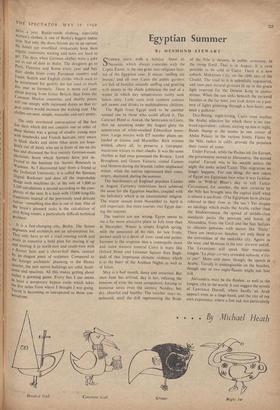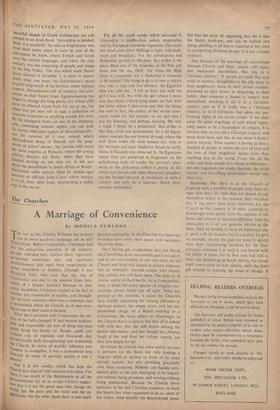Egyptian Summer
By DESMOND STEWART SUMMER starts with a holiday Shem el- Nesseem, which always coincides with the Coptic Easter, is the one great non-religious festi-. val of the Egyptian year. It means 'sniffing the breeze,' and all over Cairo the public gardens arc full of families sedately sniffing and greeting with ninety in the shade jubilation the end of a winter in which day temperatures rarely sank below sixty. Little carts with rainbow colours sell sweets and drinks to multitudinous children. The flight from Egypt used to be another annual rite to those who could afford it. The Cataract Hotel at Aswan, the Semiramis in Cairo, shut up, assuming under the August glare the appearance of white-swathed Edwardian mum- mies. Large motors a with ET number plates un- loaded at Genoa and Marseilles. Rich women wished, above all, to preserve a rice-paper, macaroon texture to their cheeks. It was the same rhythm as had once possessed the Riviera: Lord Brougham and Queen Victoria visited Cannes and Menton during the brumid, rather unpleasant winter, while the natives repossessed their coast. empty, shuttered. during the summer.
The hairdressers of England populate Cannes in August. Currency restrictions have achieved the same for the Egyptian beaches. coupled with the heliolatry which is an international religion. The winter season from November to April is still important; but more tourists visit Egypt dur- ing the summer.
The tourists are- not wrong. Egypt seems to me a far more attractive place in July even than in December. Winter is simply English spring. with the assurance of no rain, no late frosts, pushed south to a decor of river, sand and palms. Summer is the eruption into a cosmopolis more and more western (central Cairo is more like Oxford Street and Leicester Square than Bagh- dad) of that impetuous climatic violence which is at the heart of the Arabian Nights as well as of Islam.
May is a bad month, dusty and unsettled. But once June has arrived, day is hot, relaxing the tensions of even the most compulsive, forcing to immense siesta even the sternest Nordics, but dry, cheerful and healthy. The weather stays so, unhumid, until the doll representing the Bride of the Nile is thrown, in public ceremony, to the rising flood That is in August. It is even possible to be cold in Cairo. There is a new suburb, Mokattam City, on the cliffs east of the Citadel. The road to it is splendidly engineered, and runs past natural grottoes lit up in the green light reserved for the Demon King in panto- mimes. When the sun sinks beneath the pyramid families in the far west. you look down on a pat- tern of lights glittering through a heat-haze; you need a pullover.
Day-fleeing, night-loving, Cairo soon teaches the Arabic adjective for which there is no one- word equivalent : sahran, staying up late at night. Bands thump at the casino in one corner of Abdin Palace, in the various hotels. Flutes by the Nile, radios in cafés, provide the populace their ration of noise.
Under Farouk, while the Pashas left for Europe, the government moved to Alexandria. 'the second capital.' Farouk was in his seaside palace the night the tanks seized 'Cairo. This migration no longer happens. For one thing, the new rulers of Egypt are Egyptians (not what it was fashion- able in Wilfrid Blunt's day to call Turko- Circassians). for another, the new corniche by the Nile has brought into the capital itself what is almost a sea-front. (The Egyptians have always referred to their river as 'the sea.') Yet despite an ideology which exalts the Arabic rather than the Mediterranean, the spread of middle-class standards packs the pensions and hotels of Alexandria, from the Cecil and the San Stefano to obscure pensions with names like 'Daisy.' There are twenty-six beaches, yet only those at the extremities of the snakelike city, Agami in the west, and Montaza in the east. are ever unfull. The Levantines still speak their macaronic tongue. 'La plage est very crowded naltarda, n'ht- ce pas?' More and more, though, the speech is Arabic; Cavafy is unimaginable on the beaches, though one or two night-Kaunts might suit him still.
Alexandria must be the fluidest, as well as the longest, city in the world. It can suggest the novels of Lawrence Durrell, where hardly an Arab appear even as a stage-hand, and the city of my own experience, where a few sad, not particularly beautiful islands of Greek architecture are sub- merged in an Arab flood. 'Alexandria is finished, dead, at a standstill.' So said an Englishman who lived there many years. It must be true of the Alexandria he knew, where French and Greek were the current languages, and where the only industry was the importing of people and things to the Nile Valley. The vice which made Sisters Street famous is invisible; it is hard to import freely what you want; the Government's secret Imports keep much of the harbour under military Control; Alexandrians talk of industry, not com- merce, as their future hope. Egyptianisation has begun to change the long pearly city whose cliffs seem an ethereal vision from far out at sea, but when you get near are as ugly a collection of concrete structures as anything outside Tel Aviv. BY the elongated front, on one of the intermin- able, unsleeping summer nights, you can walk for twenty miles past aspects of Alexandrian life: not the carnival (if it ever existed, which Alexandrians deny) of Durrell, nor the peep- shows of sailors' stories: but taverns with much the same impetus as Peiraeus, where the young solitary dancers are likely., when they have finished turning on one slow toe, to ask you about the possibilities in South Africa or Brazil: fluorescent cafés entirely filled by middle-aged !eachers or officials from Cairo, whose holiday is to sit, hour after hour, mesmerising a coffee cup in the sea air. For all the youth camps which surround it, Alexandria is middle-class, sedate, respectable, and by European standards expensive. (An excel- lent hotel costs thirty shillings a night, with bath- room and breakfast.) For the adventurous and Bohemian, as well as the poor, Ras el-Bar is the place. Here one of the branches of the Nile still flows into the sea. (Still: for when the High Dam is completed, not a bucketful is expected to be wasted.) The thing to do is to rent a rickety hut, take a lute, and live alfresco. An Egyptian film star told me: '1 fell in love, not with the girl I was with, but with the girl whom I never saw, but whom I heard lying under our hut, with her lover, whom I also never saw, but the things she said to him, the poetry of her sexual utter- ances, made me feel prosaic, so my girl and I just lay listening, and perhaps envying. She was a maid, I think, he a policeman.' Ras el-Bar is like that, vivid and spontaneous. So is all Egypt, where concrete has not broken through, where the river flows under the most sensual sky, .twin to the warmest and least vindictive blood on earth. Shem el-Nesseem was observed by the Egyptians whose lives are preserved in fragments on the polychrome walls of tombs; the servant's utter- ances to the policeman reflect a poetry of life which was already old when lkhnaton's daughter ate her broiled chicken. A revolution in such a country can only be a cataract. Much more remains unchanged.







































 Previous page
Previous page